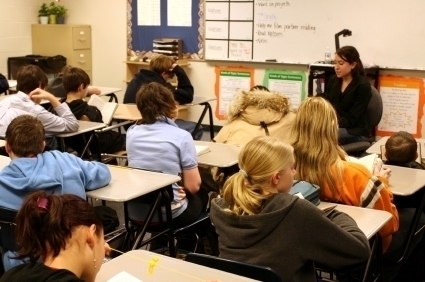Here it is again: the how-to letter those teachers always make you read at the beginning of the year from those students who managed to survive the class. Now that I’m a sage and maybe a little jaded senior, it’s my turn to give the advice. Pay heed, all underclassmen who read to the end: this WILL be on the exam.
Academics aren’t everything.
Colleges like to know they’re getting students who will glean more from higher education than just a diploma—they want kids who have shown their curiosity by pursuing goals outside of the classroom. Scholarship suppliers and employers also favor young people who pursue their passions beyond what is required. Besides the obvious collegiate advantages, being a part of a few choice activities, from basketball to debate to volunteering, will help you to build relationships and will enhance your high school experience.
But still, do well in school.
All the extracurriculars in the world won’t make a difference if you’re barely pulling a 1.5 GPA. The secret to good grades, though, is that they’re often more a reflection of the amount of work you’ve put into them than your intelligence and willingness to go the extra mile; that’s why taking advantage of your high school’s honors program, Advanced Placement or International Baccalaureate classes shows colleges that you haven’t spent four years slacking. And don’t forget that…
Extra credit is there for a reason.
It’s one of those things that students overlook all too often. Though extra credit probably won’t help you get from a B to an A, it definitely provides padding in case you miss a day of class or turn in an assignment late.
Be a little bit of a teacher’s pet.
Having good relationships with the people who are educating you isn’t just about being polite—it can really work to your advantage both now and in the long run. Asking for help or, when the time comes, a letter of recommendation is much easier if you know that you’re liked and appreciated instead of just tolerated in the classroom. You don’t have to be buddy-buddy with all of your teachers; just being respectful and cooperative will take you a long way.
Don’t procrastinate.
This is the tip I was hesitant to include because it seems to be the one people rarely follow purely because it’s so easy to blow off a reading assignment for “a few minutes” to take a nap or watch TV or check Facebook. Avoid the panic and shame of finishing up your homework at 3 a.m. by—shocker!—starting it early, maybe an hour or so after you get home, and taking quick breaks every hour to recharge and avoid academic burnout. That way you’ll get plenty of time to relax while still managing to hit the sack at a reasonable time.
Though at least one of these tips is undoubtedly one you’ve heard before from another wise old well-wisher—and all are ones I received during my first few years of high school—the truth is, they’re the ones that will prove most valuable. In a few years when you’re writing your advice to underclassmen, I guarantee that they’ll make an appearance.
So What Advice Would You Give an Underclassman?

A high school senior shares her high school advice for underclassmen.